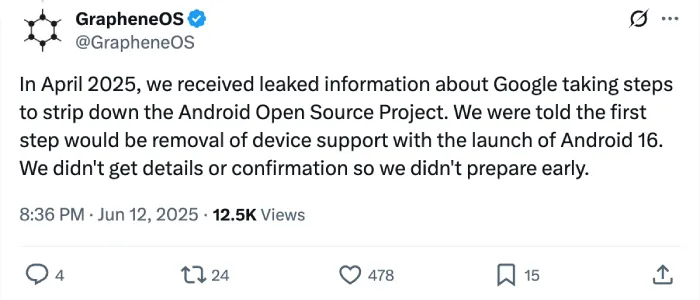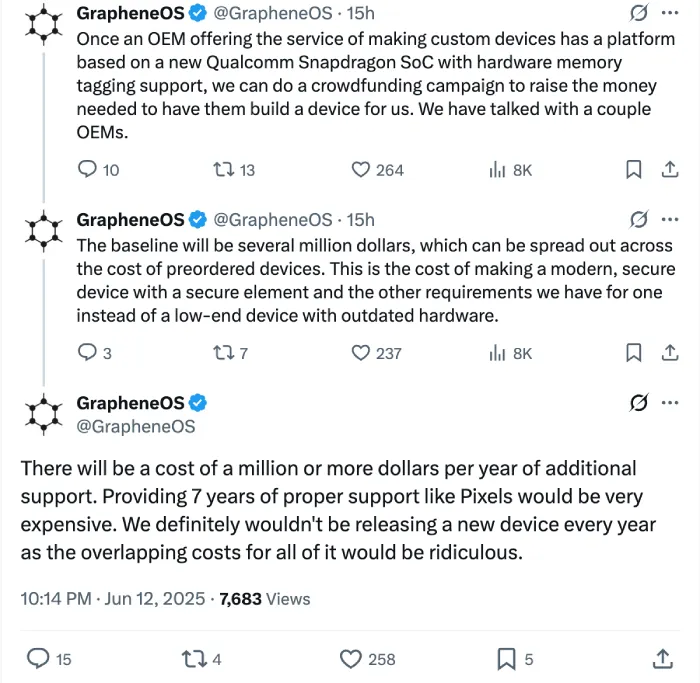Privacy-focused Android alternative GrapheneOS is hinting at a major shift in its strategy, suggesting it might work with manufacturers to create its own hardware. This comes after Google made some significant changes to the Android Open Source Project, or AOSP, the very foundation of Android, which has sent ripples through the custom ROM community.
For years, Pixel phones have been a favorite among developers looking to tinker with Android thanks to Google’s relatively open approach to AOSP. The company provided crucial files like “device trees” and driver binaries, making it easier for folks to build custom versions of Android, known as custom ROMs. But things appear to be changing. As we highlighted on our sister site PiunikaWeb yesterday, Google has apparently stopped providing these essential files with the Android 16 source code release.
While Google’s VP of Android Platform, Seang Chau, tried to calm fears by stating AOSP isn’t going away and that they’re shifting their reference device to a virtual one called “Cuttlefish,” the practical impact on custom ROM developers is huge. Without Google providing those vital files, projects like LineageOS are facing a much tougher road. They will now have to reverse-engineer these files from older versions, significantly increasing their workload and potentially impacting the quality and stability of future builds for Pixel devices. It basically puts Pixel phones on the same footing as other Android devices, losing that key advantage they once had for custom ROMs.
GrapheneOS has been pretty vocal about this on X, revealing they received leaked information back in April 2025 about Google’s plans to strip down AOSP. They were even told that device support would be removed with the launch of Android 16. Despite their lead developer being conscripted into an army, the GrapheneOS team managed to get an initial port to Android 16 done quickly, but without device support. Now, they’re scrambling to build that support themselves, starting from Android 15 QPR2 and updating things from there.
The bigger picture here is Google’s ongoing push to tighten its grip on the Android ecosystem. GrapheneOS believes this is part of a larger trend, pointing to things like the Play Integrity API, which essentially checks for valid Google Mobile Services licensing. They even suggest that Google is making these cuts and changes to Android to reduce costs, possibly in anticipation of being broken up due to antitrust lawsuits.
So, where does GrapheneOS go from here? They’re now operating under the assumption that future Pixel devices might not meet their requirements, or even support running another OS. This is a pretty big deal for a project built on providing a more secure and private Android experience, often using Pixel phones as their base.
That’s why they’re talking about building their own hardware. GrapheneOS clarified they won’t be manufacturing the phones themselves. Instead, they plan to pay an existing OEM, or original equipment manufacturer, to build devices that meet their specific security and privacy requirements. This isn’t a cheap endeavor. They estimate a baseline cost of several million dollars, which could be offset by pre-ordered devices. And then there’s the ongoing support, which could cost a million dollars or more annually.
So hats off to the folks over at GrapheneOS. In a world where most other companies are putting privacy on the sidelines, GrapheneOS is showing us that they still care by putting their money where their mouth is. You can read the full thread here.
TechIssuesToday primarily focuses on publishing 'breaking' or 'exclusive' tech news. This means, we are usually the first news website on the whole Internet to highlight the topics we cover daily. So far, our stories have been picked up by many mainstream technology publications like The Verge, Macrumors, Forbes, etc. To know more, head here.






nope21-06-2025
I thought the messaging from grapheneOS was that AOSP changes effectively didn't affect their process much. So, what's the deal?
Reply